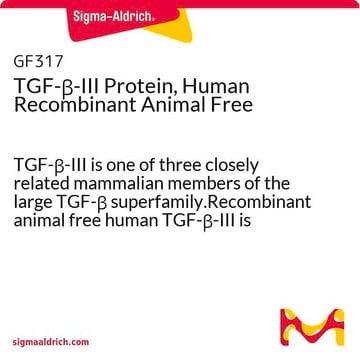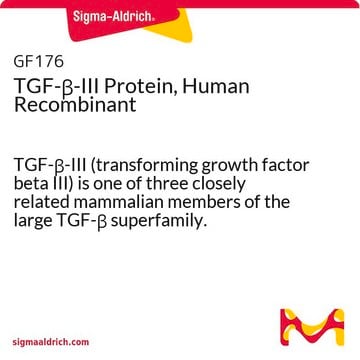H8791
Transforming Growth Factor-β3 human
TGF-β3, recombinant, expressed in HEK 293 cells, HumanKine®, suitable for cell culture
Sinônimo(s):
TGF-β3
About This Item
Produtos recomendados
fonte biológica
human
Nível de qualidade
recombinante
expressed in HEK 293 cells
Ensaio
≥95% (SDS-PAGE)
forma
lyophilized powder
potência
≤1.0 ng/mL EC50
qualidade
endotoxin tested
peso molecular
dimer 25 kDa (non-glycosylated)
embalagem
pkg of 5 μg
fabricante/nome comercial
HumanZyme
condição de armazenamento
avoid repeated freeze/thaw cycles
técnica(s)
cell culture | mammalian: suitable
Impurezas
≤1 EU/μg
nº de adesão UniProt
temperatura de armazenamento
−20°C
Informações sobre genes
human ... TGFB3(7043)
Procurando produtos similares? Visita Guia de comparação de produtos
Categorias relacionadas
Descrição geral
Ações bioquímicas/fisiológicas
forma física
Nota de preparo
This product is lyophilized from a solution of 50mM NaOAc, pH 3.7.
Nota de análise
Informações legais
produto relacionado
Código de classe de armazenamento
11 - Combustible Solids
Classe de risco de água (WGK)
WGK 3
Ponto de fulgor (°F)
Not applicable
Ponto de fulgor (°C)
Not applicable
Certificados de análise (COA)
Busque Certificados de análise (COA) digitando o Número do Lote do produto. Os números de lote e remessa podem ser encontrados no rótulo de um produto após a palavra “Lot” ou “Batch”.
Já possui este produto?
Encontre a documentação dos produtos que você adquiriu recentemente na biblioteca de documentos.
Os clientes também visualizaram
Nossa equipe de cientistas tem experiência em todas as áreas de pesquisa, incluindo Life Sciences, ciência de materiais, síntese química, cromatografia, química analítica e muitas outras.
Entre em contato com a assistência técnica









